On this year's World Cancer Day, which occurred on Friday, 4 February, the theme was the equity gap in cancer care.
“People who seek cancer care hit barriers at every turn. Income, education, geographical location and discrimination based on ethnicity, race, gender, sexual orientation, age, disability and lifestyle are just a few of the factors that can negatively affect care.”
According to the Centers for Disease Control and Prevention, health equity is achieved when every person has the opportunity to attain his or her full health potential and no one is disadvantaged from achieving this potential because of social position or other socially determined circumstances.
To gain a deeper understanding of how this equity gap affects racial minorities, Kimberly Richardson, a patient advocate,and cancer survivor, was our guest for the first LinkedIn Live broadcast of 2022.
Kimberly is the Founder of the Black Cancer Collaborative, a nonprofit organization that focuses on the capacity building of black cancer patients and the acknowledgment of these patients in the medical and science environment.
Here's a recap of some of Kimberly's points made during the broadcast. This is just a small sample of the deep conversation we had with Kimberly, and we encourage you to watch her recording on our YouTube channel to learn more.
When Kimberly was diagnosed with a rare form of ovarian cancer called Granulosa Cell Tumor in 2013, she explained how unsupported she felt by "the very people I thought were supposed to offer me care." This experience gave Kimberly the inspiration to begin her advocacy work. It was important to her to make sure that other people wouldn't have to go through the same experience of feeling unsupported and not understanding their diagnosis and treatment options.
In 2020, Kimberly is diagnosed with a second type of cancer, this time triple-positive breast cancer. This is a very different situation than before. In the intervening years, she has done her research, and she has met “wonderful oncologists and great researchers with a great passion for the work they want to do in cancer research.”
“I was able to go to them and say, these are my test results. What does this say, right? What are some of the next steps? What are some of the questions I need to be raising? And so I hate to use the word empowered because it sounds like somebody had to give you power in order for you to use it.”
Her oncologist told Kimberly she would have to undergo 33 consecutive radiation treatments, but after conducting research she found she could undergo accelerated partial breast radiation. However, the oncologist disagreed with this plan of treatment, so Kimberly turned to a radiation oncologist, who said, "I'm very familiar with that study.". And yes, you'll be able to do that.”
“From thirty-three consecutive treatments to five over 10 days,” says Kimberly. “That is the ability to take information and make an intelligent decision, one that you would think you'd be able to make with your oncologist, someone who would tell you about all your treatment options. But when that doesn't happen, that's what my advocacy is about. It's about providing that information someplace else. That you can then bring those pieces of paper in and say this is a study. And if you're not being heard, then that raises a red flag with you that perhaps you're not dealing with an oncologist that is the most up to date.”
Kimberly shared her passion for advocacy, encouraging others to get involved “once you're out of the fog of treatment…I like to support people that are coming into a survivorship plan and let them know that your voice can be heard and in very important ways.”
Kimberly believes strongly that this goes beyond “just sharing our stories and what we're now calling our lived experience, but then applying it where policy can actually make a change.”
In a message to healthcare professionals, cancer researchers, and industry stakeholders, Kimberly says, patient stories, are “more than the warm-up.” “We are asked to come on and share our cancer story in five minutes and then to get on with the business of the day when we are the business of the day. We’re the reason you are doing the job you are doing.”
She believes that patients need to put a value on their stories. “The work of a patient advocate is to say that out loud, that my story matters. It's meaningful and it has a place at that table.”
Kimberly points out that “it's one thing to say, we have a seat and a voice, but it doesn't mean anything at the end of the day if it's just it's considered. But then you see your work, your ideas come to fruition through a company.”.
Despite efforts to increase diversity in clinical trials, racial/ethnic minority groups generally remain underrepresented, making it difficult for researchers to test the efficacy and safety of new interventions across a wide range of populations.
Kimberly says she is tired of the narrative that black patients mistrust the healthcare system and this is the reason they are not involved in clinical research. “It’s just simply not the case,” says Kimberly. The real reason is “because we simply have not been asked to participate, as well as Asians, as well as Native Americans, as well as Latinos. We have not been asked to participate.”
To make real change, believes Kimberly, we have to involve everyone. “To move that dial on cancer research… if we really think we're going to find a cure, it's going to take all of us. If you're not there, that's one unanswered question.”
Towards the end of the conversation, we asked Kimberly what the healthcare community can do in order to close the care gap.
“For oncologists, I ask you, I implore you, to be better at how you communicate with your patients. And for researchers, I ask you to see us as equal partners in this research that you bring a scientific skill and I bring a lived experience and they matter and those things together are going to help you with your research, design, and your protocols and ultimately with the results of your studies.”
“And when we talk about closing the gap. Let's be authentic. And acknowledge that these gaps exist. And do more than just go, Oh my God, that's horrible. Yeah, let's start thinking about ways to fix what we know we can fix. It's possible to fix this.”
Here at merakoi, we are committed to bringing you stories from the edge of healthcare. Our mission is to share the voices you often don't hear in healthcare. It is more important than ever to bring a diversity of perspectives to the table.
We can only hope to transform healthcare in a way that is meaningful and impactful for all patients, regardless of their circumstances, by doing so. If you are interested in hearing more stories from the edge, join our mailing list to learn about future events.


✕